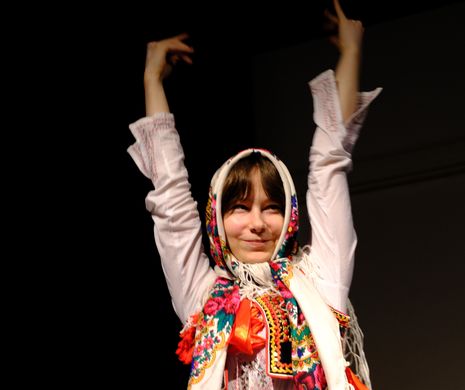Liminal Space: ‘This multimedia feast for the senses needs to be savoured’
Manon Harvey sits down with the cast and crew of the show ahead of opening night

“The one thing that connected all of us was the fact that we miss bread from home.” As Dominika Wiatrowska, writer and performer, explains this, the rest of the production team burst out in peals of laughter. I ask what is wrong with the bread in England. Dominika shudders in horror: “Every single person that I spoke to whilst making this show, they were like… ‘I just miss my Eastern European bread’.” This is not the first time in the rehearsal space that someone brings up something they miss from childhood. The discussion is saturated with deeply personal connections to Eastern European culture. The air is thick with a kind of wistfulness, a longing that feels almost palpable.
“Discussion is saturated with sentimentality, punctuated by regular anecdotes and deeply personal accounts of connection to Eastern European culture”
Liminal Space is a story about belonging. Or not. Specifically, Liminal Space addresses what it means to teeter on the space ‘in between’ - navigating a dual reality of living between places. “When you come from a different country to a new country you start losing those ties that you had... And at the same time you don’t really feel like you are fully attached to the new one. You’re always going to be in between. You’re always going to exist in this liminal space,” Dominika explains.
The play is semi-autobiographical, following Dominika’s journey as she grows up somewhere ‘between’ Poland and the UK between the ages of 13 and 22. It delves into moving to university in another country, navigating romantic relations in a second language, and her exploration of religious identity.
As Dominika explains her inspiration, I'm struck by how much of it resonates with me. I mention this to the room and the group nods. “Liminal space is such a universal experience, yet at the same time, such an isolated one,” Anna Sanderson (director), points out. We have all at some point in our lives experienced the ‘in-between’, experienced that visceral sense of discomfort in transition. For many of us, university is one such moment, stuck somewhere between youth and adulthood. Dominika hopes the audience will be able to recognise this and empathise with her story.
“We have all at some point in our lives experienced the ‘in-between’”
Marta Zalicka (producer) found reading the script incredibly moving, as she locates her own experience of migration in the script. In mainstream media, whenever there are stories about an immigrant, they aren’t usually told by an immigrant. And in that story, the person just becomes the figure of the ‘immigrant’. She was initially drawn to the script because it challenges this narrative.
One particular tension that Dominika explores in the script is finding a balance ‘between’ national identities. She is keen to emphasise that finding yourself does not have to involve making a choice. ‘‘The message of the play is the acceptance of living in this in-between forever. The acceptance of like, two things that are not compatible being compatible.’ I have often found that there are aspects of myself that are somewhat contradictory, that don’t quite seem to make sense. As I speak this sentiment aloud, I am quickly reassured. “You are not a monolith,” Anna says, “You can be multiple people at once.”
“The message of the play is the acceptance of living in this in-between forever”
Dominika explains how she tried to write this ‘grey’ area into the script, arguing that nothing is black or white. She doesn’t want to highlight particular ‘good’ or ‘bad’ aspects of either country. “I want to explore living in Poland and the UK with all its pros and cons … simultaneously the beautiful things about it and the not so beautiful.” She argues that when you move between places, you can’t rely on them to tell you who you are or what you should be doing. Instead, you have to find who you are within. This is what she aims to do by telling her story – discover and learn what it might mean to belong.
I ask what it was like to write a play in a second language. Dominika replies that many parts of identity cannot be verbalised and are only tangible to the audience when felt. This show showcases what it is like to live as a Polish immigrant. It is packed to the brim with Polish music, dance, language, clothing, and food, modern and traditional. One intriguing aspect is the way in which these interactive elements work to combat cultural stereotypes: “Often Eastern Europe is seen in, like, sad economic terms, or as something archaic... What is brilliant about this show is the way we can see real modern Eastern European representation,” Anna explains. To add to this contemporary feel, Dominika interviews people in Cambridge who were born in Lithuania, Romania, the Czech Republic, and other Slavic countries. The play is authentic and truthful, promising to be a multimedia feast for the senses.
“Many parts of identity cannot be verbalised”
From this interview, I can tell how much care the team has put into this project. Dominika emphasises that this show is about celebrating diversity: “What I am most proud of is that the team has been made up primarily of women and non-binary people, and also the fact that we managed to get so many immigrants working on it and being a part of telling this story.” She also highlights that writing and performing this show in Cambridge is likely to become almost an impossibility (for reasons why you will have to watch the show). This show must be savoured. It is an opportunity to showcase and celebrate the richness and complexity of living in that ‘space between’, about learning to find and ground yourself in a world that insists on moving and shifting around. So if you find yourself ‘in between’ essays, stuck in that ‘liminal space’ between dinner and going to bed, head down to the Corpus playroom on the 20th February to watch this brilliant show.
Liminal Space is on at 9.30pm on Tuesday 20th February at the Corpus Playroom.
 News / Cambridge academics stand out in King’s 2026 Honours List2 January 2026
News / Cambridge academics stand out in King’s 2026 Honours List2 January 2026 Interviews / You don’t need to peak at Cambridge, says Robin Harding31 December 2025
Interviews / You don’t need to peak at Cambridge, says Robin Harding31 December 2025 Comment / What happened to men at Cambridge?31 December 2025
Comment / What happened to men at Cambridge?31 December 2025 News / Varsity’s biggest stories of 202531 December 2025
News / Varsity’s biggest stories of 202531 December 2025 Features / “It’s a momentary expression of rage”: reforming democracy from Cambridge4 January 2026
Features / “It’s a momentary expression of rage”: reforming democracy from Cambridge4 January 2026










